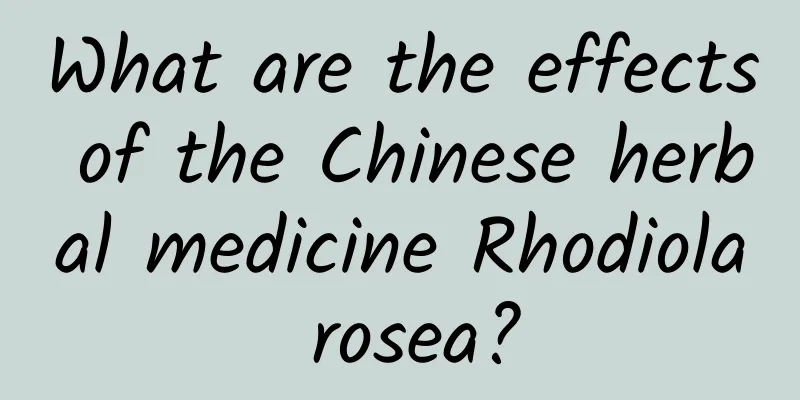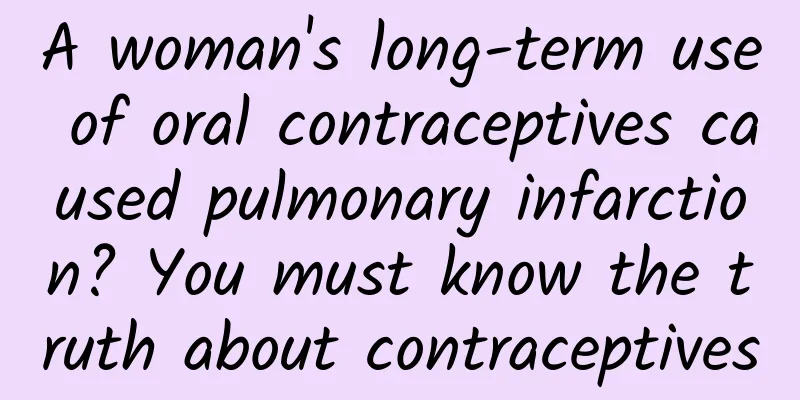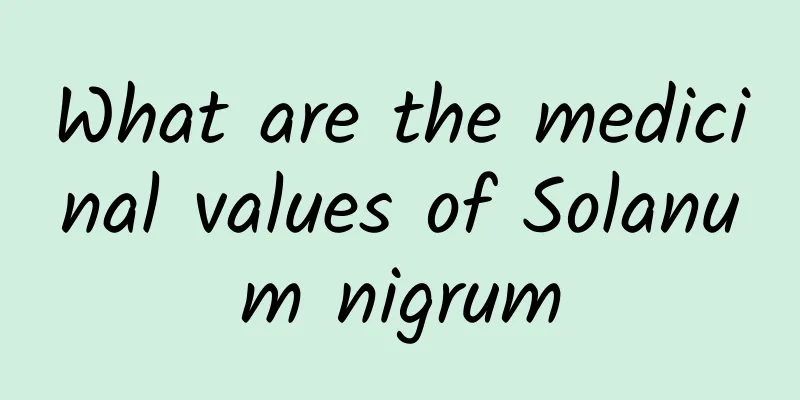What are the effects of the Chinese herbal medicine Rhodiola rosea?

|
Traditional Chinese medicine has been popular in our country for thousands of years. Although Western medicine has developed rapidly in recent years, traditional Chinese medicine has also made great contributions to the medical field. Among them, the application of Chinese herbal medicine has brought great benefits to the majority of patients. Each Chinese herbal medicine has different effects and functions. If used well, not only the disease can be cured, but the physical condition can also be regulated. So, what are the effects and functions of the Chinese herbal medicine Rhodiola rosea? The efficacy of Chinese medicine Rhodiola rosea Clears the lungs and relieves cough, strengthens the spleen and nourishes the heart, stops bleeding and relieves blood stasis. It is mainly used to treat lung heat cough, hemoptysis, heart and spleen deficiency, palpitations and fatigue, shortness of breath and weakness, leucorrhea in women, altitude sickness, bruises and injuries from falls, and burns. 1. "Commonly used Chinese herbal medicines in Tibet": promote blood circulation and stop bleeding, clear the lungs and stop coughing, reduce fever, treat coughing up blood, hemoptysis, pneumonia cough, leucorrhea in women, etc. For external use to treat injuries from falls, burns and burns. 2. "Illustrated Guide to Drugs on the Qinghai-Tibet Plateau": reduces fever, benefits the lungs, treats pneumonia, and nerve paralysis. Effects of Chinese medicine Rhodiola rosea (pharmacological effects) 1. Effects on the cardiovascular system Salidroside can significantly reduce the left ventricular end-diastolic intraventricular pressure and blood pressure of rats in a short period of time, reduce the preload and postload of the heart, improve cardiac function, and can also significantly reduce various indicators reflecting the contractile performance of the myocardium and weaken the contractile performance of the isolated heart. Salidroside exhibits a bidirectional effect on isolated frog hearts, first excitatory and then inhibitory. Rhodiola rosea alcohol extract can significantly increase the arterial blood pressure of rats and show a certain dose-effect relationship. The alcohol extract can also reverse the decrease in blood pressure caused by phentolamine, and the effect on heart rate has no regular changes. Rhodiola rosea has a certain cardiotonic and vasoconstrictor effect. Salidroside has a protective effect on myocardial cells damaged by reoxygenation after hypoxia. It can maintain the normal beating frequency of myocardial cells after reoxygenation after hypoxia, reduce the release of LDH, and maintain the normal ultrastructure of myocardial cell membrane, myofibril, mitochondria, etc. 2. Effects on the central nervous system Rhodiola rosea ethanol extract can counteract the memory impairment in mice caused by scopolamine and significantly improve the memory retrieval impairment caused by ethanol. Salidroside can enhance the excitability of the brainstem reticular system, stimulate the spontaneous potential activity of the cortical sensory-motor area, visual area and major subcortical structures, and enhance the potential changes in response to photoelectric stimulation. Rhodiola rosea can correct the content of the neurotransmitter 5-HT in the central nervous system that deviates from normal levels, which is an important condition for the body's overall sound function and improved endurance to adverse factors. 3. Effects on immune function Rhodiola rosea can increase the percentage of T lymphocytes in the peripheral blood of mice, and significantly increase the weight and index of the spleen and thymus. Rhodiola rosea polysaccharide can reduce the peripheral blood Hb content of normal mice, and increase it in immunocompromised mice. It has no significant effect on the peripheral blood leukocytes and thymus weight of mice. It can promote the transformation reaction of spleen lymphocytes and the killing activity of NK cells in normal mice, and at the same time reverse the above indicators of immunosuppressed mice. Rhodiola rosea can regulate the specific and nonspecific immune functions of the normal human body under low temperature conditions, enhance cold resistance, and accelerate the establishment of cold adaptation. 4. Anti-tumor effect In vitro experiments show that Rhodiola rosea extract can inhibit the growth rate and division ability of human nasopharyngeal carcinoma cells, and has an inhibitory effect on the growth and proliferation of cancer cells. Rhodiola rosea can also inhibit the growth and proliferation of in vitro cultured liver cancer cells and mouse transplanted liver cancer cells, reduce DNA synthesis, increase glycogen content, and prolong the survival of tumor-bearing mice; Rhodiola rosea can inhibit in vitro cultured liver cancer cells in the S phase. Rhodiola rosea has an inhibitory effect on S180 cells, and the efficacy is dose-related. Its anti-tumor effect is relatively selective, and the same dose has no toxic effect on non-tumor cells. Rhodiola rosea also has an inhibitory effect on HeLa cells. 5. Anti-radiation effect Rhodiola rosea can improve the survival rate of X-ray irradiated mice, prolong their survival time, improve the thymus and spleen indexes, and significantly increase the spleen lymphocyte transformation rate and the percentage of helper T cells in the thymus of mice after irradiation. Rhodiola rosea can reduce the production rate of micronuclei in bone marrow polychromatophilic cells and significantly inhibit the production of LPO in the heart and liver caused by radiation. Salidroside can reduce the production of LPO in irradiated tissues, has the effect of protecting lipids and cell membrane damage, and can be used as a good radiation protection drug. The water extract of Rhodiola rosea root has a good effect in inhibiting induced mutations, can reduce the incidence of micronuclei in bone marrow polychromatin cells and sperm deformity, and counteract the damage to the DNA of mouse somatic cells and germ cells caused by short rod bacteria vaccine. 6. Anti-hypoxia effect The alcohol extracts of Rhodiola rosea roots and rhizomes can significantly improve the tolerance to hypoxia in various mouse hypoxia models, reduce the oxygen consumption rate, prolong the survival time of animals in a low-oxygen environment, and significantly increase the fasting liver glycogen and blood sugar levels of animals. Rhodiola rosea alcohol extract can significantly reduce the overall oxygen consumption of mice, reduce the content of blood, myocardial and brain lactic acid in rats, and improve the aerobic metabolism process under hypoxic conditions. Rhodiola rosea ethanol extract can effectively prevent the impact of high altitude hypoxic environment on heart and lung function, and inhibit the prolongation of PR interval, QRS period and QT interval of human electrocardiogram caused by altitude. 7. Anti-aging effect Rhodiola rosea has a strong antioxidant effect, can promote protein synthesis, reduce acid phosphatase activity, increase SOD and GSP-Px activity, inhibit the formation of LPO, inhibit the degenerative changes of organelles, and can delay or prevent the aging of rat cerebral cortical neurons, glial cells, synapses and blood-brain barrier. Rhodiola rosea can delay cell aging, promote cell growth and metabolism, inhibit degenerative changes in rough endoplasmic reticulum and mitochondria, enhance liver glycogen synthesis, inhibit the formation of lipofuscin in hepatocytes, and reduce the content of LPO in liver tissue. Rhodiola rosea can also promote the division of fibroblasts in the dermis and their synthesis and secretion of collagen. It also secretes collagenase to decompose the original collagen, but the amount of secretion is greater than the amount of decomposition. Rhodiola rosea powder can significantly reduce the LPO content in the blood, liver, and testes of 14-month-old mice and the lipofuscin content in the testes. Rhodiola rosea ethanol extract can reduce LPO and cardiac lipofuscin in mice. Rhodiola rosea root extract can improve the body's immunity and muscle mobility, increase the activity of SOD, and reduce blood TG content. 8. Hepatoprotective effect Rhodiola rosea decoction has a certain protective effect on animals with CCl4 liver damage. It can increase plasma SOD value, reduce LPO amount, reduce serum sGPT, LDH, and CK activity, and reduce the degree of liver cell degeneration and necrosis. 9. Antiviral effect Rhodiola rosea polysaccharide improves and enhances the myocardial function and immune function of mice infected with Coxsackie virus B5 (CVB5), and enhances the ability of mice to resist CVB5 infection. Rhodiola rosea polysaccharide can effectively prevent the adsorption of CVB5 to host cells and inhibit the replication of the virus in host cells. Rhodiola rosea tyrosol also has a protective effect on cells infected with CVB5 virus within the non-toxic dose range. 10. Other effects Intramuscular, intravenous and intraperitoneal injections of Rhodiola rosea polysaccharide can produce significant hypoglycemic effects, but oral administration is ineffective. Rhodiola rosea decoction has a synergistic effect with sodium thiopental, which can antagonize the convulsive effect of caffeine; it can inhibit the effects of Adr in raising blood sugar, insulin in lowering blood sugar, NA in raising blood pressure, and histamine in lowering blood pressure, thereby improving the high temperature resistance of mice. 11. toxicity The LD50 of Rhodiola rosea decoction injected intraperitoneally in mice is 8.6g/kg. There are reports of teratogenic effects of oral administration of Rhodiola rosea in rats. |
<<: What are the effects of Xiaodaohong wine?
>>: Does Panax notoginseng have any side effects? Many people are unaware of the precautions
Recommend
You can recognize everything by taking a photo. How does AI “understand” pictures?
Welcome to Science Popularization China’s special...
The efficacy and function of short-bodied eel
In daily life, people are not only very familiar ...
Chameleon's color-changing skin, scallop's "telescopic" eyes, his research is invisible molecules, but he can use the secrets of nature to develop magical instruments
·Publisher of this issue: Tao Kai is a researcher...
Can "misdiagnosis" also harm your health? The "disease perception" in "Zhou Chu Eliminates Three Evils" really exists!
"Zhou Chu Eliminates Three Evils" is a ...
Why can giant pandas grow so fat even though they only eat bamboo?
Giant pandas are our national treasure and one of...
It is said that only people with shortsightedness can understand this picture...
Do you remember what steps are usually taken befo...
Heavy rains hit South China, and the fourth-level emergency response for flood control was launched! How to prevent floods scientifically?
The reporter learned from the Ministry of Emergen...
The efficacy and function of Mingecao
The Chinese medicine Ming'ecao is already ver...
Can wolfberry be eaten frequently?
Speaking of wolfberry, I believe many people are ...
The efficacy and function of pear wood bark
The development of Western medicine has brought s...
Who are the consumers of black wolfberry?
Black wolfberry is a kind of wolfberry with black...
Is it useful to wash your hair with mulberry root bark? What is the method?
With the increase of life pressure and environmen...
The efficacy and function of sword bean shell
Do you know sword bean shell? It is a common Chin...
Gastrodia elata capsules
In our daily life, if we work for a long time wit...
What are the medicinal properties of Acanthopanax?
Speaking of Acanthopanax, I believe many people d...









